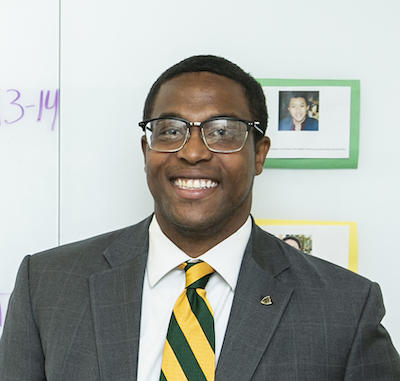Philip Wilkerson: A Conversation on Career Management for College Students
by Zayd Hamid
Culminating a summer article series on student success, the PW Perspective’s Zayd Hamid spoke with George Mason University Career Services employer engagement consultant Philip Wilkerson III on how students can develop and manage their professional skills in college.
Before the podcast recording started, we talked about career success as needing a positive sum mindset. It’s not like slices of pie, we agreed. People who have a zero-sum mindset see other people taking slices of pie as reducing the amount of pie available. However, people with a growth mindset recognize that baking pies is a skill that can be taught, and more pies can be created if more people know how to bake. Career success, like baking, is a skill that can be taught and learned by anyone interested.
Wilkerson began the interview by recognizing that college career services are in a transitionary phase, citing an article from the Career Leadership Collective. As the demand for services from college career centers grew and changed in scope, career centers must adapt to meet a new era. Career centers, in Wilkerson’s view, are obliged to lead their institutions’ transitions into career ecosystems, an interconnected support system across stakeholders with the shared mission of promoting positive career outcomes for students.
Speaking on George Mason’s Career Influencers Network, a training offered by GMU Career Services to upskill faculty and staff in promoting student career success, demonstrated what his university is already doing to increase growth-minded, cross-unit learning. He pondered if creating a student-facing program like the Career Influencers Network could help career centers meet the moment. By teaching students how to support their peers’ career journeys, students could become career success ambassadors. For Wilkerson, empowering students to professionally support their peers’ career success is not competing with a career services center. Rather, it’s the opposite; by preparing students to succeed in peer-to-peer career support roles, career services centers expand the number of capable partners on campus with a shared student career success mission.
As a PhD in Communication student at GMU, Wilkerson places a high value on the importance of diverse communication skills within students’ career success toolboxes. “See something, say something” is how he describes his framework for active relationship maintenance. “If I read something, I send it to someone. If I see something on Instagram, I forward it to someone. We do that all the time on Instagram, we doomscroll and send stories. Take that same mindset and say, when I read about something, who else would like to know this?” By sharing news articles, LinkedIn posts from organizations, etc. with relevant professionals, students can check in with their network and learn new insights.
Another way that students can use published media such as the Mason Spirit Magazine to identify potential career contacts, something Wilkerson calls a “pro tip for students.” “If you see anything in an article that’s relevant (to you,) look up the person they’re talking about and send them a LinkedIn message saying hey, my name is so-and-so, congratulations on your award, etc. It shows that you read the feature and there’s an icebreaker. All articles, all information, are icebreakers.” No matter who you want to talk to, there’s something out there you can use to help you start the conversation.
Adding to his point, Wilkerson also gave a hypothetical example of reading a quantum physics paper for class, being confused about the content, and reaching out to a professional in your network who can tell you more about the topic to foster your learning. “If you go at it with the sense of asking them (professionals in your network) questions, you don’t even have to talk that much. You can just say ‘I read this and didn’t understand it’ and they’ll just go ad nauseam. Or you can ask ‘how did you win that award” and they’ll tell you their whole life story.” Wilkerson sees asking good questions as a particularly strong career tool for introverted students. “If you keep asking questions, that will drive the conversation.”
Wilkerson identifies alumni as a particularly significant demographic for students to develop their professional conversation skills with. “In the (career) ecosystem, maybe there’s a young alumnus that’s still on their first job and living in an apartment, but they can come and mentor somebody. All that takes is their time and their talent. So, I think as we tap into the ecosystem, we’re going to see a lot more alumni-student mixers, low-stakes connections where people are coming as alumni not to hire these students, but just to relate and build connections. And, for the student side, they won’t feel like they have to have their résumé there; they can just talk to somebody.”
Career management is a communication skill, one that manifests itself in different ways depending on the situations a student is in and their position relative to the person they’re talking to. But, like baking a pie, communication is a skill that can be developed. Just like anyone can learn how to bake a pie, anyone can learn to communicate for career success.
The full conversation with Wilkerson will be available on his podcast, Positive Philter, within the next few weeks on both Apple Podcasts and Spotify. PW Perspective readers, especially students, are encouraged to listen to the full podcast for more insights on communication for career success and more.



